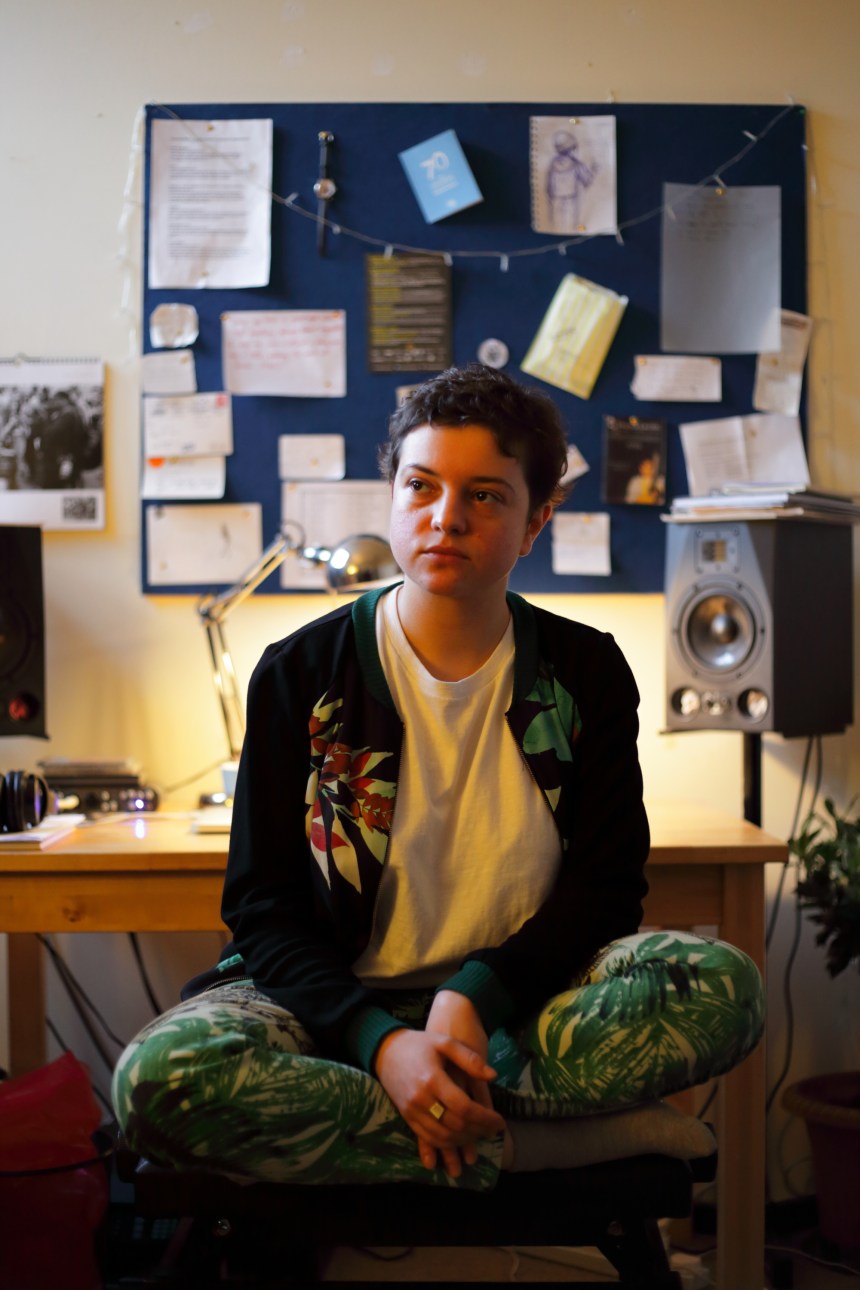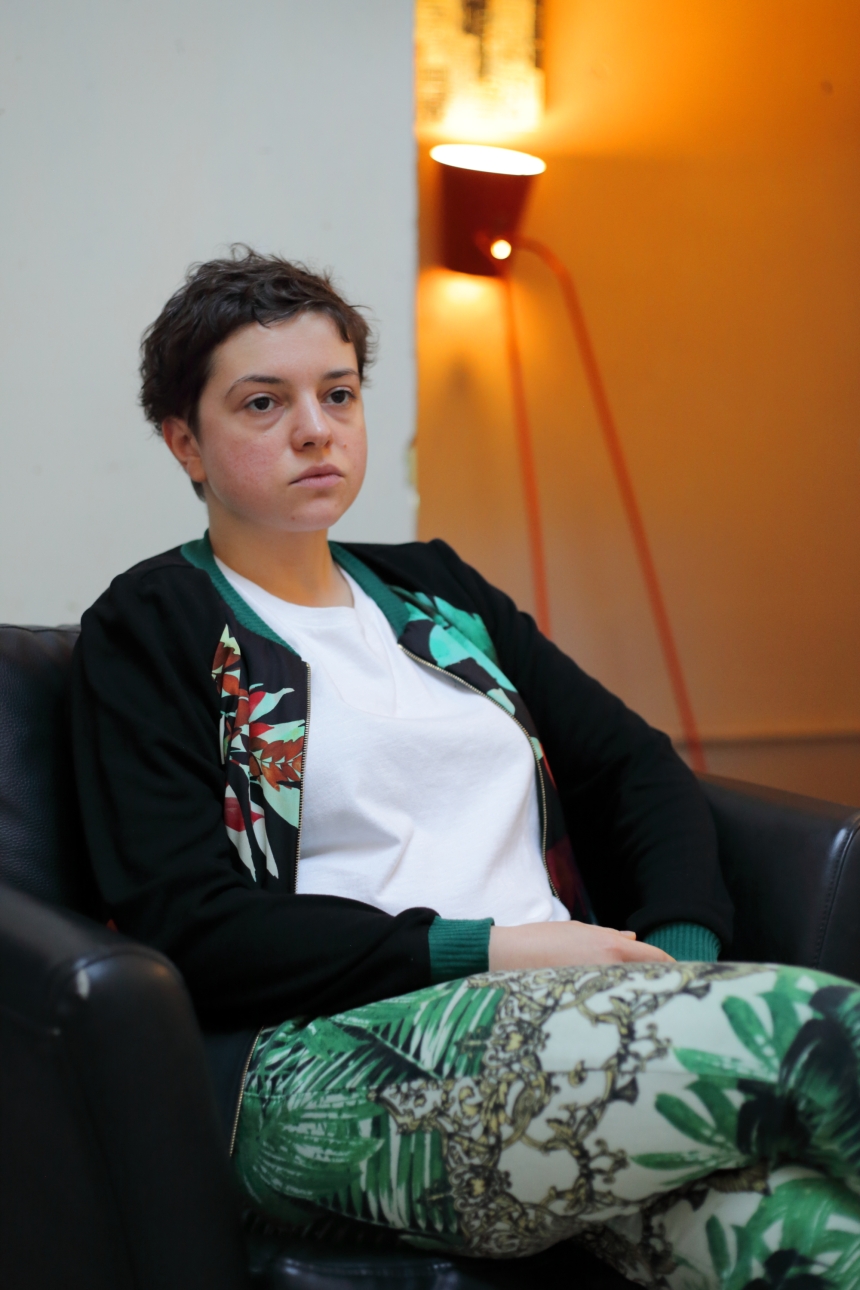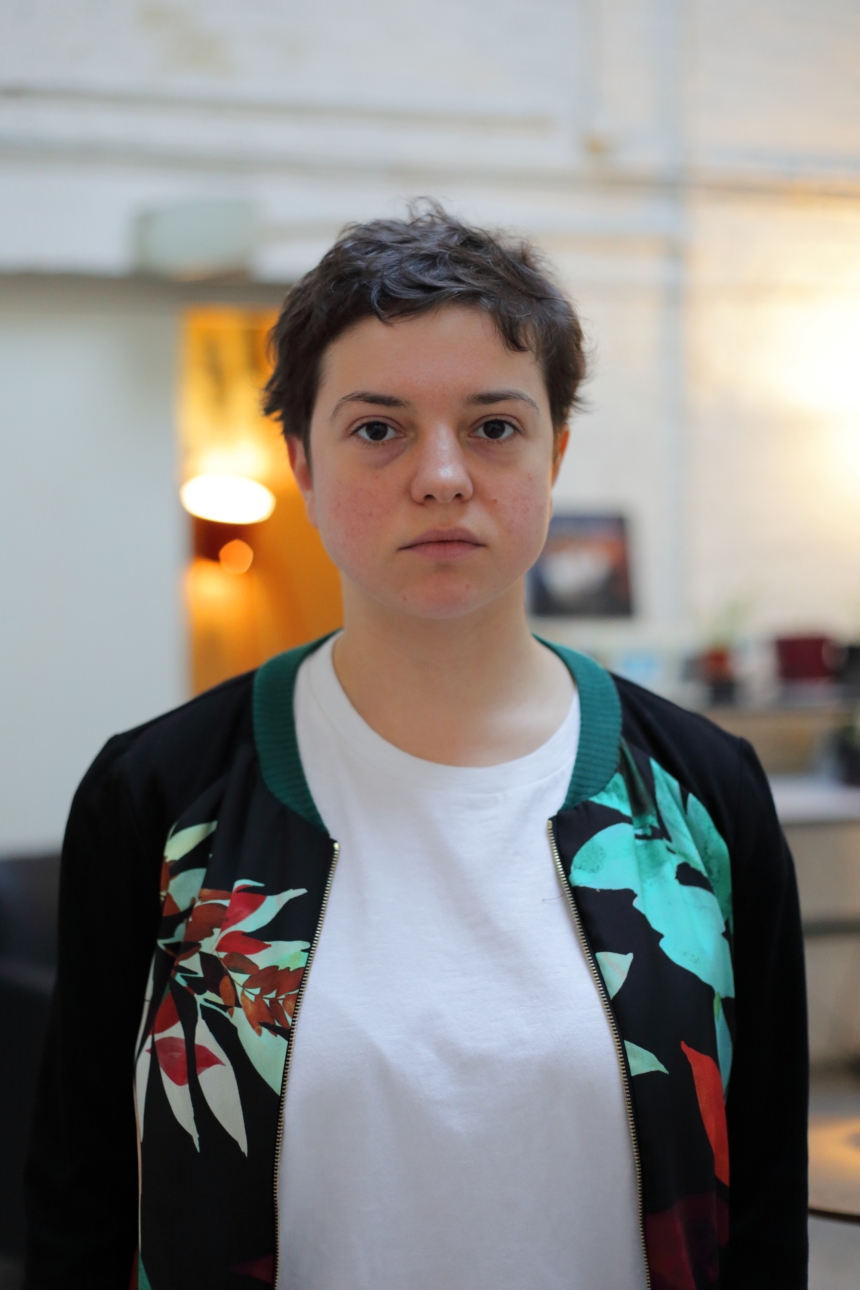I have this great drive in my brain for adventure. I just want to go for it, even if I lose sometimes. It’s part of the game. Somehow, I just love risk.
Meet Barbs Dudek—known on stage as Barbs Goldrain—an emerging electronic music artist and singer-songwriter based in London. Barbs has composed music for screen and produced and released electronic music. Now, she has turned her attention to embracing a new frontier in her musical output with which she is far less familiar: live performance, on stage.
I greet Barbs at the door of a warehouse conversion in south London, where she rents a room-turned-music-studio. Barbs is friendly in an empathetic way; it’s pretty obvious in the first five minutes of having met her she wants to hear all about you as much as you want to hear all about her. The sound of recent rain dripping from the leaves of roadside trees on wet tarmac fades.
* * *
Growing up in Poland after the country gained independence in 1989, Barbs enjoyed an environment with a rich music and artistic culture. Her town had a theatre, a philharmonic orchestra and a world-renowned jazz festival.
“I feel I was lucky to be growing up in Poland after 1989. I know from stories of my sisters and parents that years before were much tougher for Polish families. The economic situation has changed so much; the country is much richer, which allows people to take on various activities.”

Barbs started learning piano at the age of seven, shortly followed by guitar and drums.
“The more I learned how to play, the more my fingers would just play around. It was always very natural to me. I wouldn’t block myself from doing it.”
Barbs was not the only person in her family to be musical; her grandfather had been a church organist and ran his own choir. When she visited him, the two would sing and play the piano together.
“When everyone sang happy birthday in unison, he’d be the one singing the harmonies.”
Barbs was able to form several musical branches by the time she was finishing high school. She’d become proficient in piano works by classical composers, among them Chopin, Debussy and Ravel. She’d been inspired by bands like Depeche Mode and Massive Attack, which informed her sense of style. And she’d also become actively involved in a film studies class: Barbs fell in love with independent cinema.
One experience gave Barbs a real appetite for professional music production. A friend of hers, an artist, asked her to make some music for her solo art exhibition, which involved an abstract video work.
“We really understood each other in terms of how we felt about the video. With a little explanation from the artist the work simply followed. Art allows you that magnificent freedom to just create and experiment.”
It took a couple of false starts in further study to get on track. She enrolled first in Business Studies at Wrocław University, followed by Culture Studies. But neither felt right for her.
Staying in Wrocław, she enrolled in a two-year course in sound engineering, which gave her a solid working proficiency in music and sound production.
Barbs had been working in a recording studio and local opera house in Poland, but something didn’t feel right: she didn’t feel like staying. Only two months after having graduated, she and her friend decided to hitchhike—to London.

“It took us two days to get to London. We stayed over at friends in Koln in Germany and visited another lovely couple in Gent, Belgium. Although the unknown sounds like a great risk, sometimes it’s safer than we think.”
In London, Barbs took jobs in cafés and bars while she got her feet on the ground and figured out where to study music, eventually settling on a three-year programme in Music Production and Composition at London Centre of Creative Media.
* * *
“How about you jump on the film that I’m working on and you do sound for us?”
“Why not?”
Barbs’s entrance into composing professionally was helped by her having a degree in sound engineering. Her first professional job came from a friend who invited her to do the sound on a film. When it turned out that friend didn’t have a composer lined up, either, Barbs put herself forward and landed her first film-scoring gig.
Barbs became a sought-after sound recordist and designer, receiving more and more technically challenging jobs. But it was getting serious, and she felt real passion only for music, so she stopped saying ‘yes’ to sound projects.
Barbs had been able to compose for musicians at LCCM, including for a quintet with clarinet, and outside university she had begun to miss sharing music with others.
“To be able to exchange the ideas and hear your music that you’d normally have in your head out loud—that’s a great experience.”
Now, Barbs new project—putting together a band—is well underway.
Creative Londoners: Why live performance, why now?
Barbs Goldrain: I don’t know. I feel like it’s always been with me but I’ve never had the courage to pursue that path until now.
I was always too afraid to actually push myself. I was finding my way around it. I was having conversations with myself throughout the years. ‘Well maybe I don’t have to do this…’ ‘I’m not good enough at that.’ And then there’s the other side of it. Which is just having a life that is not exactly yours —’cause you’re too afraid to live it. This realisation made me do it.
CL: When you’re performing, do you feel your music is more authentic to you?
BG: More authentic? I’m not sure you can say it’s more authentic, because there’s nothing less authentic about writing for a movie. It comes from a different place though. When you’re on stage it’s a bit more wild—in a sense it’s all about the connection you have with yourself and the audience. You never know what’s going to happen exactly. You share the story you’ve lived or an observation, which makes it more personal and demands greater courage, but it’s also far more fulfilling. People clap to your blood, sweat and tears and that gives you real confidence.
CL: What kind of people have you been looking for to work with in a band?
BG: Definitely people who are open to co-writing and bringing ideas to the table. I’m quite lucky to surround myself with amazing, creative creatures. I’ve got very talented musicians on board so far. Owen Smalley plays guitar. He’s got that rocky sound, bit distorted, very melodic with a great feel for soloing. Harry Moore plays drums. He digs Steve Gadd, so we get along. Also he’s really into experimenting with different sounds that can be executed by stacking cymbals on one another and adding various percussions to the groove. Andrew Leishman is our bass guy. He’s got very mellow sound, which just melts every heart and he’s known to drop that juicy slide from time to time. On vocals I’m joined by amazing mezzo-soprano, Enya Sophya. She’s classically trained singer, violinist and composer but also a really good friend.
What’s important to me is the connection and dynamic you have with people you work with. We’re obviously different, but as long as we ‘click’—have similar influences and attitudes or willing to find a common ground—I know we’re home. I bring the lyrics, melodies and chords and guys just fill it how they want. Freedom to express is something I value very highly and it’s also a learning curve for my artist’s ego—to be able to let go and let the magic happens. On the other side as a composer you have certain moments in music which you have to execute in particular way otherwise you don’t get to sleep… but guys respect that too and often work with me to achieve that, which makes me nothing but grateful.

I support my band mates as much as I can, ‘cause when we go on stage—it might be a challenge and I understand it. I want them to feel comfortable and relaxed as much as possible, knowing that we’re in it together. I wrestle my demons and they are doing the same, so I’m very respectful of the courage these sensitive and often anxious creatures put into work.
I’m hoping to start gigging with the band early autumn this year under name ‘Goldrain’. We’ll be looking to play in intimate venues and interesting spaces—like warehouses, galleries and festivals down the line. My close friend Kay Humelt is working on the visual side of the project, so expect some beautiful and imaginative prints to accompany the music.
CL: Where the idea to do singer song-writing stuff came from?
BG: I don’t know. I feel like it’s always been with me but I’ve never had the courage to do it until now.
I’m naturally quite a shy person and talking is not my favourite thing. I often get really nervous and can’t stop blabbing. Expressing myself through music and writing comes naturally, so I can thrive as a human being that way. Most of my lyrics are just experiences I’ve had and I’m willing to share with others. Or something I observed and is somehow moving my soul to the point where I can’t do anything else but just write a song about it. Music comes from somewhere else though, I’m trying not to get in the way too much.
CL: What’s something you’ve learned?
BG: I learn all the time, but the most significant realisation was that learning is quite a vulnerable process itself where you have to open you heart and give up your ego—just let go of it—and after that moment magic comes. Now is not a matter of ‘making it’ in the industry but enjoying the ride with your fellow mates having the map and choosing to go places. Also I’ve learnt that we’re not doing the job making ourselves smaller, so that other people don’t feel insecure around us. The goal is to let our own light shine, which happens when we liberate ourselves from our own fears. Hell yeah.
CL: Why did you decide to move to London?
BG: I think it’s the energy of the city. It attracts people of a certain mind set and meeting them is truly enriching experience. And I feed on it, but I also contribute to it as well—it’s fair deal. I’ve always wanted to work with people who would understand me or at least stop underestimating me and they just happen to live in London.
It’s also beautiful city visually and historically. Just an afternoon stroll in Greenwich Park or Kyoto Garden in Holland Park is enough to put you right back in track.
My casual hang out is National Gallery—looking at some Rembrandt or Flemish painting. Later on just next door at St Martin in the Fields they do amazing chamber music and lunch time concerts are free, so it’s perfect when you skint. White Cube in Bermondsey is amongst my favourite contemporary art galleries too. I live in Kennington and there’s a Walworth Community Garden round the corner, which I often go to write.
Just being exposed to both contemporary and historical art on a daily basis is a huge privilege. It boosts my imagination and gives me time to reflect. I also need to charge my battery and nature does the trick for me. London has loads of secret places to discover. Our romance has lasted for about six years and is still going.
You can really find anything you’re looking for, sounds like a paradise—maybe a little more polluted, but it is. I hope London’s not going to change much after Brexit and we, as musicians, will be able to to tour the rest of the world with no extra visas or perturbations. It’s significant to our growth to be able to exchange ideas and share experiences with others as a human being, so why on earth would you want to disturb that?
You can follow Barbs Goldrain on Facebook and Instagram and find her music on Spotify:
Words and photographs by Oliver Gudgeon.
